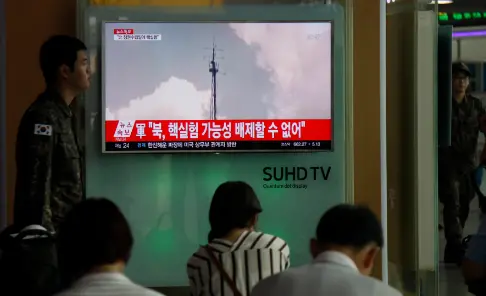The UN Security Council on Friday adopted a resolution to reinforce the objectives of a major treaty banning nuclear test, amid growing nuclear threat posed by the Democratic People' s Republic of Korea (DPRK).
The 15-member body adopted the U.S.-drafted resolution with 14 votes in favor and an abstention by Egypt. It calls on all states to refrain from conducting any nuclear weapon test explosion and pushes for early entry into force of the Comprehensive Nuclear-Test-Ban Treaty (CTBT), 20 years after the pact was open for signature.
The legally binding CTBT is a multi-lateral treaty by which states agree to ban all nuclear explosions. It has been ratified by more than 160 countries and will enter into force 180 days after the ratification of all 44 states listed in the annex.
"Over the past 20 years, nuclear test ban has become a common understanding of the international community," said Liu Jieyi, China's permanent representative to the UN, after the council voted on the resolution.
"The adoption by the council today of this resolution is of great significance for commemorating the opening for signature of the treaty, reaffirming the purpose of nuclear test ban and advance an early entry into force of the treaty," he added.
U.S. Secretary of State John Kerry said the resolution is a "strong and necessary statement of our principles and promises as a global community."
"It does reinforce the core purposes and objectives of the CTBT itself: to diminish our reliance on nuclear devices, to reduce competition among nuclear powers, and to promote responsible disarmament," the top U.S. diplomat said.
Friday' s resolution came after the DPRK conducted its fifth nuclear test earlier this month. The UN Security Council has called the test a flagrant disregard of the nuclear non-proliferation regime.
"The timeliness and importance of this resolution are underscored by the DPRK's latest nuclear test, a direct threat to international peace and security and a reminder of the value and absolute necessity of the CTBT," U.S. State Department said in a statement.
The CTBT's International Monitoring System and International Data Centre rapidly detected the nuclear test conducted by the DPRK, offering a stark reminder of why the infrastructure built to support this treaty is so vital and why passing this resolution is so important, the statement said.
China supports the UN Security Council to make further reaction to DPRK's latest nuclear test, Chinese Premier Li Keqiang said as he met with U.S. President Barack Obama in New York on Monday.
"China is committed to denuclearization of the peninsula, to maintaining peace and stability there and to settling the issue through dialogue," Li said.
(APD)
 简体中文
简体中文

